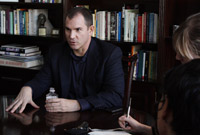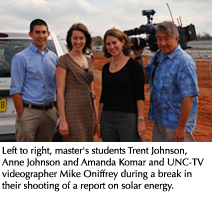The Connection December 2010
The Connection is the newsletter of the Science and Medical Journalism Program at the University of North Carolina at Chapel Hill's Hussman School of Journalism and Media.
Food critic Bruni comes home to UNC
 By Stephanie Soucheray-Grell
By Stephanie Soucheray-Grell
UNC graduate Frank Bruni battled with emotional overeating his whole life. So he was a curious candidate for the job of The New York Times restaurant critic. When he was offered the position in 2004, he had just lost 50 pounds and was learning to stop treating food as a friend.
“I was the Times correspondent in Rome and I had learned to eat properly there,” Bruni recently told a group of journalists at UNC, where he was promoting his memoir “Born Round.”
“When they offered me restaurant critic, I thought ‘I can do this job and keep off the weight,’” Bruni said.
Bruni, who graduated from UNC-Chapel Hill in 1986, has since left the restaurant critic position to work on his own writing full time and write for The New York Times Magazine. “Born Round” explores his life as an overweight child in an Italian-American family in New Jersey.
Bruni writes about food and family with the pleasure and familiarity of someone who’s had large portions of both, but his book isn’t merely a rose-colored food memoir.
As a homosexual teen, Bruni used food to deal with feelings of low self-esteem. He yo-yo dieted and had episodes of bulimia throughout his twenties and thirties when he worked for the Detroit Free Press and The Times.
Bruni said he has received hundreds of e-mails from food addicts who have read his memoir and found that his story was “theirs.” He said most e-mails come from straight women and gay men.
He said working as a restaurant critic forced him to dine out six days per week, something he found enjoyable but challenging if he wanted to eat more healthfully.
But Bruni acknowledged that good food isn’t always attainable or affordable. He said that’s where food warning labels, or higher taxes for junk foods could come into play.
Bruni, who had not been back to campus since his graduation, was a guest speaker at the sixth annual UNC Conference on Eating Disorders. “I still probably associate food too heavily with pleasure and satisfaction,” Bruni said. “But there’s something to be said about the European model that focuses on food quality, not quantity.”
Photo by Josh Davis
A conversation with...
Professor Edward Wasserman
Edward Wasserman, Knight Professor of journalism ethics at Washington and Lee University in Lexington, Va., recently spent two days as a guest of the UNC science and medical journalism program exploring the nexus between ethics and reporting.
Between talks to medical journalism and ethics classes in the J-school, Wasserman shared his thoughts with first-year master's student Stephanie Soucheray-Grell. (The following was edited for publication.)
Q: What’s your number one piece of advice for a young journalist who runs into a potential ethical conflict while working on a story?
A: People should trust their guts. That would be the first piece of advice. What I try to do as a teacher is reassure students that they already know a good deal about right or wrong. I try to furnish them with vocabulary with which to withstand assaults on the innate sense they already have. In many respects the challenge is to resist corrupting influences. I would also tell a young journalist that his or her boss is not always right, and also explain to them that journalism is a profession embedded in a business. Not everything you experience has a moral character.
Q: Why did you get interested in ethics and journalism?
A: I was a journalist starting in 1972 and through 2002, with only a five-year break for graduate school. My interest in ethics came late. Ethics is an ideal perspective to bring to media operations because of how the business of news is conducted these days. The 24-hour news cycle, deadline pressure, competition from social media outlets, traditional media’s migration online... all of these changes lead to ethical decisions and business decisions.
Q: Any thoughts on science and medical journalism and ethics in particular?
A: I’m rather astonished by the lack of leadership coming from health professionals in regard to health care reforms in this country. They’ve gone AWOL. It seems they’ve bought into this insipid set of reforms that does nothing to emancipate medical business from the stranglehold of big hospitals, big pharmacy and big insurance. Where are those voices?
Students produce reports on
alternative energy for N.C. Public Television
 Students in Dr. Tom Linden’s science documentary television course (JOMC 562) produced two video reports on alternative energy that appeared on North Carolina Public Television in December.
Students in Dr. Tom Linden’s science documentary television course (JOMC 562) produced two video reports on alternative energy that appeared on North Carolina Public Television in December.
One report, which explored the state of solar energy in North Carolina, was produced by second-year J-school master's student Amanda Komar. The associate producer was Trent Johnson, a master's student in the UNC Gillings School of Global Public Health, and the script writer was Anne Johnson, a second-year master's student in the science and medical journalism program.
The other report examined what various North Carolinians are doing to advance hybrid-electric vehicle technology. That report was produced by Carrie Gann, a second-year master’s student in the science and medical journalism program. Associate producers were environmental studies student Casey Stern and continuing student David McInnes. Undergraduate journalism major Grace Joyal wrote the script.
Both pieces were shot and edited by UNC-TV’s Mike Oniffrey.
During the last 10 years, students have produced more than 30 reports that have aired on North Carolina Public Television. The student-produced reports have won two regional Emmys and a number of student awards from the Society of Professional Journalists, Region II.
Addiction studies for journalists
By Stephanie Soucheray-Grell
I recently had a rare opportunity to spend two days spent in a room with experts who wanted to talk with me. Not only did they want to talk, they were passionate about my getting the science right.
That’s the set-up for the twice-yearly addiction studies program for journalists sponsored by Wake Forest University School of Medicine and National Families in Action. Journalists from across the country are invited to hear pharmacologists, psychologists, advocates and statisticians share the latest findings about addiction and behavior.
At the last workshop in San Diego in November, scientists and researchers stopped their presentations several times to answer questions from the 16 journalists in attendance. Later, journalists participated in story brainstorming sessions.
David Friedman, a professor of pharmacology at Wake Forest, and Sue Rusche, president of National Families in Action, said they put on the program because journalists are often the first to get it right – or wrong when it comes to covering stories about addiction. The more journalists can understand the science behind addiction the better they can explain the complex issues that underlie the problem.
Take drunk driving in the U.S., a story that nearly every medical journalist covers. According to Harold Holder, a researcher at the Prevention Research Center, in Berkeley, Calif., an American driver has a 1 in 2,000 chance of being pulled over when drunk. In Australia, which is comparable to the U.S. in alcohol consumption and car use, a driver has a 1 in 2 chance of being stopped by police. Random street checks by police have conditioned drivers to expect a police presence when drinking.
The next workshop will be held June 17-18, 2011, in conjunction with the Annual Meeting of the College on Problems of Drug Dependence in Hollywood, Fla. For more information, go to www.addictionstudies.org.